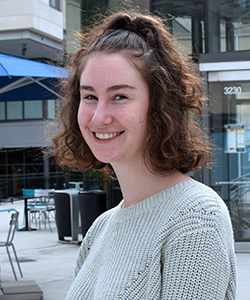
Degree: BS Physics '20
Research interests: Disease-oriented biophysics, innovations in medical physics
Co-op: Research Assistant, Drexel Department of Physics
Extracurricular activities: Drexel Treblemakers (a cappella group), Women in Physics Society, Pennoni Honors College
Awards: A.J. Drexel Scholarship, Walter R. Coley award for academic excellence in physics
Emily Harkness joined Drexel's Department of Physics on a quest to understand the universe — and encountered a community that encouraged her to explore the breadth of her degree.
Tell us about your recent courses, trips, research experiences and/or co-ops.
In the fall, I finished up my research co-op in biophysics with the Drexel physics department. As a research assistant under physics professor Dr. Frank Ferrone, I was in charge of fixing up an old experiment that uses laser photolysis. I learned so much through my research, and I'm hoping to learn even more through my courses this term.
For my course schedule, I took Probability and Statistics, Differential Equations, Quantum Mechanics and Observational Astrophysics. It has been exciting to delve into even more abstract concepts in physics while grounding myself in the practical mathematical ideas presented in statistics and differential equations. I had a lot going on with challenging courses, moving into a new apartment and starting up again as PR chair of my a cappella group, but I enjoyed all of it.
How was your co-op experience?
My co-op experience has been fantastic! Through co-op, I've discovered a lot about my own ambitions while learning about what it's really like to do research. While it's often frustrating in the moment to deal with roadblocks in research, I realize looking back that I've accomplished so much in a short period of time.
What kind of research are you interested in?
My current research is in biophysics, specifically the kinetics of sickle hemoglobin polymerization using laser photolysis. More generally, I'm interested in medical or disease-oriented biophysics research, which is basically studying the physical causes of physiological responses to disease. This research can range from the thermodynamics and kinetics of different diseases to computer modeling of proteins. I'm also very interested in medical physics research, which focuses more on developing instrumentation like scanning technology or thermal drug therapy techniques.
Which element of your Drexel experience do you identify with most, and why?
The part of my Drexel experience I identify most with is my major and the community surrounding it. I've found a number of wonderful, welcoming communities at Drexel that I love being a part of, but the physics department at Drexel is where I feel most understood. Being surrounded by people who understand your passion is really amazing, especially when the department is as small and close knit as ours.
What is one thing a faculty member has told you that stuck with you?
A professor once told me that engineers can't do what physicists can do, but physicists can do what engineers do. I don't know if that's necessarily true, but when I was anxious about switching my major from electrical engineering to physics, it was nice to hear that I would have exciting job prospects and something worthwhile and unique to contribute to society as a physicist. I obviously have a lot of respect for engineers, but it's okay to need validation that studying what you love is worthwhile.
What motivates you?
My ultimate motivation is to help people, and a secondary motivation is understanding the universe. I really feel that both can be pursued in conjunction with each other, though they are very different.
What advice do you have for a high school student looking for an undergraduate program?
My advice for a high school student interested in physics would be to keep an open mind. Coming in to the program, I had ideas about the major that turned out to be totally wrong. I thought I wanted to be a theorist, and now I'm leaning toward medical physics. Before that, I wanted to be a teacher. There are so many possibilities in physics; try to explore every opportunity so you know what's out there!